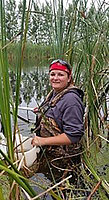A Comparison of Wetlands across the Urban - Peri-Urban - Rural Gradient

Alexis Steinman is a Master of Science student in the School of Natural Resource Sciences at North Dakota State University. She holds a Bachelor of Science degree in Natural Resources Management from North Dakota State University. Her present research is focused on understanding the impacts of urbanization on wetland water quality, vegetation, and soil across the rural to urban gradient.
Phone: 701-425-3605
Fellow: Alexis Steinman
Advisor: Christina L.M. Hargiss, Ph.D., Assistant Professor, Natural Resources Management Program, North Dakota State University.
Degree Progress: M.S. in Natural Resources Management, expected graduation Spring 2017
A Comparison of Wetlands across the Urban - Peri-Urban - Rural Gradient
Increased impacts upon wetlands throughout eastern North Dakota have occurred due to various anthropogenic activities. These activities include both agricultural practices and urban sprawl. As cities expand, many naturally occurring wetlands are degraded or destroyed. In order to imitate services provided by natural wetlands, such as flood attenuation and water purification, storm water detention ponds (urban wetlands) are constructed in cities. The current condition of these sites is unknown. Urban wetlands have never been evaluated within North Dakota. The impacts of urbanization on water quality, vegetation composition, and soils in wetlands across the urban, peri-urban, and rural gradient is unknown.
Therefore, a total of 30 sites will be evaluated for this study, 10 in each category (rural, peri-urban, urban). At each site, the plant community will be assessed to determine the number of native, introduced, annual, perennial, and biennial species present. The plant community data will then be compared across the gradient. Also, soil profiles will be assessed at each site to determine the presence or absence of hydric soils across the gradient. Additional assessment of water quality at each site will include the analysis of cations, anions, Total Nitrogen, Total Phosphorous, nutrients complete, trace metals, total suspended solids (TSS), and e. coli. Each of these parameters will be compared across the gradient. By comparing the soils, plant community, and water quality at each site across the gradient, this study will provide valuable insight into the impacts of urbanization on wetlands. Information from this project will be useful to professionals and managers working with water quality, wetlands, ecosystem services, and urbanization within the state.
Project Objectives:
The main goal of this project is to assess water quality and vegetation in wetlands across the urban, peri-urban, and rural gradient. The specific objectives of this project are to:
- obtain baseline water quality data for urban wetlands and assess water quality changes across the urban-rural gradient;
- assess wetland condition across the urban-rural gradient using the Index of Plant Community Integrity (IPCI), North Dakota Rapid Assessment Method (NDRAM), and Floristic Quality Index (FQI);
- evaluate changes in vegetation composition (annual/perennial, introduced/native, invasive) across the urban-rural gradient; and
- if possible, determine the presence/absence of hydric soils across the gradient
Progress:
Currently, water quality sampling and data entry for the 2015 field season (July – September) are complete. Vegetation surveys for each site were completed in summer 2015, and analysis of the data is ongoing. Each of the thirty sampled wetlands have been GPSd. Further data analysis will be completed once the 2016 field season is complete. Additional sampling during the 2016 field season will include:
- water quality sampling once a month (April – September);
- completion of the North Dakota Rapid Assessment Method (NDRAM) at each site;
- if possible, each site will be sampled to determine if the soil profile contains hydric soil indicators during the 2016 field season.
Significance:
Over the past two decades, urbanization and urban sprawl have increased across the world. The majority of the world’s human population currently lives in urban areas, and the urban population density is expected to continue to increase. As a result, the study of urban ecology has emerged in response to the impacts of urban development and sprawl across the landscape. The majority of previous urban ecology research has been conducted in Europe, China, and coastal regions. However, currently, limited research has been specifically conducted on urban wetlands nationally and internationally. Previous research efforts in North Dakota have never focused on urban wetlands. Thus, this project provides a unique opportunity to expand the field of urban ecology locally, nationally, and internationally by completing the first comparison of wetland water quality, soil, and vegetation composition across the urban, peri-urban, and rural gradient. Locally, this study provides the first opportunity to understand urban wetlands in the area, determine impacts of urbanization on wetland water quality, and establish an initial comparison of wetlands across the rural, peri-urban, and urban gradient in eastern North Dakota.
Completion of this project will provide several data sets comparing wetlands across the rural, peri-urban, and urban gradient. Acquired data sets will include: 1) complete vegetation composition across the gradient; 2) water quality data across the gradient; 3) first GPS mapping of selected urban wetlands, which were not found on the U.S. Fish and Wildlife Service National Wetland Inventory; and 4) condition assessment of each wetland across the gradient.
Conference/Seminar Presentations:
Alexis Steinman, Christina Hargiss, Jack Norland. “A Comparison of Wetlands across the Urban - Peri-Urban - Rural Gradient.” North Dakota Chapter of the Wildlife Society Annual Meeting February 2016, Mandan, North Dakota. (Poster)
Alexis Steinman, Christina Hargiss, Jack Norland. “Understanding the Impacts of Urbanization on Wetlands.” North Dakota Water Quality Monitoring Conference March 2016, Bismarck, North Dakota. (Poster)

Christina Hargiss
Natural Resources Management
Morrill Hall 203B
Telephone: 701-231-8451
Email: christina.hargiss@ndsu.edu


